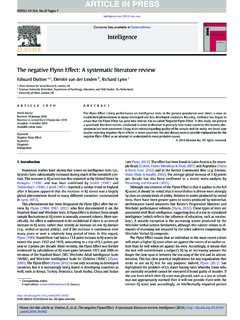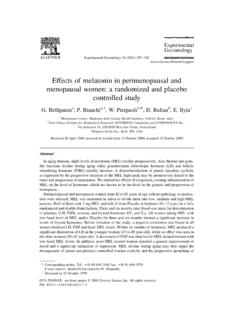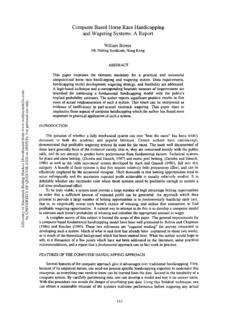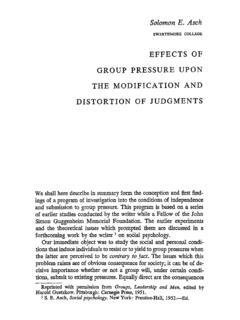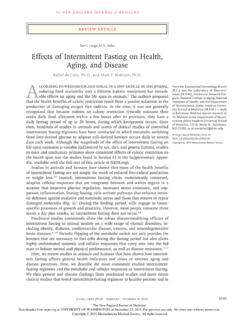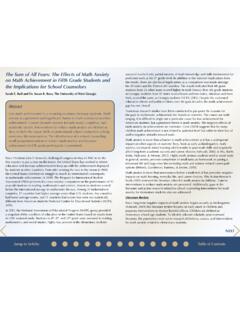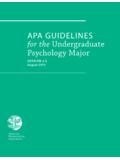Transcription of The role of deliberate practice in the acquisition ... - Gwern
1 Psychological Review1993, Vol. 100. No. 3, 363-406 Copyright 1993 by the American Psychological Association, Role of deliberate practice in the acquisition of Expert PerformanceK. Anders Ericsson, Ralf Th. Krampe, and Clemens Tesch-RomerThe theoretical framework presented in this article explains expert performance as the end result ofindividuals' prolonged efforts to improve performance while negotiating motivational and externalconstraints. In most domains of expertise, individuals begin in their childhood a regimen ofeffortful activities ( deliberate practice ) designed to optimize improvement.
2 Individual differences,even among elite performers, are closely related to assessed amounts of deliberate practice . Manycharacteristics once believed to reflect innate talent are actually the result of intense practiceextended for a minimum of 10 years. Analysis of expert performance provides unique evidence onthe potential and limits of extreme environmental adaptation and civilization has always recognized exceptional individ-uals, whose performance in sports, the arts, and science isvastly superior to that of the rest of the population.
3 Specula-tions on the causes of these individuals' extraordinary abilitiesand performance are as old as the first records of their achieve-ments. Early accounts commonly attribute these individuals'outstanding performance to divine intervention, such as theinfluence of the stars or organs in their bodies, or to specialgifts (Murray, 1989). As science progressed, these explanationsbecame less acceptable. Contemporary accounts assert that thecharacteristics responsible for exceptional performance are in-nate and are genetically simplicity of these accounts is attractive, but more isneeded.
4 A truly scientific account of exceptional performancemust completely describe both the development leading to ex-ceptional performance and the genetic and acquired character-istics that mediate it. This account must specify the criticaldifferences between exceptional and ordinary performers. Itmust also show that any postulated genetic differences can behereditary and are plausible from an evolutionary in behavioral genetics (Plomin, DeFries, &McClearn, 1990) now argue that this is a very challenging taskK. Anders Ericsson, Institute of Cognitive Science, University ofColorado at Boulder; Ralf Th.
5 Krampe and Clemens Tesch-Romer,Max Planck Institute for Human Development and Education, Berlin,Federal Republic of empirical research for this article was conducted at the MaxPlanck Institute for Human Development in Berlin. Research supportby the Max Planck Society and support and encouragement from PaulBaltes are gratefully thank Peter Usinger and Stefanie Heizmann for their help in thedata collection and Catherine Ashworth, Gregory Carey, RobertCrutcher, Janet Grassia, Reid Hastie, Stefanie Heizmann, CharlesJudd, Ronald Kellogg, Robert Levin, Clayton Lewis, William Oliver,Peter Poison, Robert Rehder, Kurt Schlesinger, Vivian Schneider, andJames Wilson for their valuable comments on earlier drafts of thisarticle.
6 Helpful suggestions and valuable criticism by Richard Shiffrinon previously submitted versions of this article are gratefully concerning this article should be sent to K. AndersEricsson, who is now at the Department of Psychology R-54, FloridaState University, Tallahassee, Florida observed behavior is the result of interactions betweenenvironmental factors and genes during the extended period ofdevelopment. Therefore, to better understand expert and ex-ceptional performance, we must require that the account spec-ify the different environmental factors that could selectivelypromote and facilitate the achievement of such performance.
7 Inaddition, recent research on expert performance and expertise(Chi, Glaser, & Farr, 1988; Ericsson & Smith, 199la) has shownthat important characteristics of experts' superior performanceare acquired through experience and that the effect of practiceon performance is larger than earlier believed possible. For thisreason, an account of exceptional performance must specifythe environmental circumstances, such as the duration andstructure of activities, and necessary minimal biological attrib-utes that lead to the acquisition of such characteristics and acorresponding level of account that explains how a majority of individuals canattain a given level of expert performance might seem inher-ently unable to explain the exceptional performance of only asmall number of individuals.
8 However, if such an empiricalaccount could be empirically supported, then the extremecharacteristics of experts could be viewed as having been ac-quired through learning and adaptation, and studies of expertperformance could provide unique insights into the possibili-ties and limits of change in cognitive capacities and bodilyfunctions. In this article we propose a theoretical frameworkthat explains expert performance in terms of acquired charac-teristics resulting from extended deliberate practice and thatlimits the role of innate (inherited) characteristics to generallevels of activity and emotionality.
9 We provide empirical sup-port from two new studies and from already published evi-dence on expert performance in many different Historical BackgroundSir Francis Gallon was the first scientist to investigate thepossibility that excellence in diverse fields and domains has acommon set of causes. He found that eminent individuals inthe British Isles were more likely to have close relatives whowere also eminent although not necessarily in the same do-main than to have distant relatives who were eminent. Heconcluded that eminence, that is, exceptional performance in a363364K.
10 ERICSSON, R. KRAMPE, AND C. TESCH-ROMER field, must be transmitted from parents to their offspring. Gal-ton (1869/1979) argued that eminence was a virtually inevita-ble consequence of inherited "natural ability," which was theconjunction of three types of elements:By natural ability, I mean those qualities of intellect and disposi-tion, which urge and qualify a man to perform acts that lead toreputation. I do not mean capacity without zeal, nor zeal withoutcapacity, nor even a combination of both of them, without anadequate power of doing a great deal of very laborious work.



